ExpressVPN vs IPVanish: Which is Better? Tested 2025
ExpressVPN and IPVanish are both quality VPN services, so it’s hard to know which one to choose. ExpressVPN is widely considered one of the best, while IPVanish is a robust choice with lower prices. To find out which is better, my team and I put both VPNs through rigorous tests in 13 categories, looking at servers, speeds, security, torrenting support, advanced settings, and more.
After extensive testing, ExpressVPN is the overall winner. It has faster speeds, broader streaming capabilities, stronger security, and even works in China (few providers do). However, IPVanish is still a very strong choice at a significantly lower price tag than ExpressVPN, which may be a better option for your budget.
It’s also worth noting that all ExpressVPN plans are backed by a 30*-day money-back guarantee, while IPVanish only offers this with long-term plans. It’s risk-free to test either VPN for yourself, so take a look at our in-depth results and see which one is right for you. Editor’s Note: Transparency is one of our core values at WizCase, so you should know we are in the same ownership group as ExpressVPN. However, this does not affect our review process, as we adhere to a strict testing methodology.
No Time? Here’s a 1-Minute Summary
 |
 |
|
| Pricing | a month with the 2-year plan | a month with the 2-year plan |
| Streaming | Works with 20+ Netflix libraries, Amazon Prime Video, Hulu, Disney+, Max (HBO), BBC iPlayer, and more | Works with 4 Netflix libraries, Amazon Prime Video, Hulu, Disney+, BBC iPlayer, and more |
| Servers | 3,300+ servers 105 countries | 2,400+ servers 109 countries |
| Speed | Average speed loss of 7% | Average speed loss of 12% |
| Security |
All the standard security features, plus superfast Lightway protocol, ad and malware blocker, and RAM servers |
All the standard security features |
| Torrenting | Supports torrenting Privacy-friendly jurisdiction |
Supports torrenting SOCKS5 proxy servers |
| China | One of the best VPNs for China | Doesn’t work in China |
| Gaming | Excellent speeds | Excellent ping |
| Device Compatibility | Compatible with more devices, but only allows 8 simultaneous connections | All major operating systems and allows unlimited device connections |
| Company Jurisdiction | British Virgin Islands (outside the 5/9/14 Eyes) | US (inside the 5/9/14 Eyes) |
| Privacy Policy | Multiple independent audits verify its no-logs policy | 1 independent audit, but dubious data-sharing history |
| Payment Options | More payment options Credit cards, Paypal, Mint, & Bitcoin |
Major credit cards & PayPal |
| Customer Support | Fast and helpful 24/7 live chat, email, and ticket support | 24/7 live chat, phone, email, and ticket support with helpful but slow responses |
ExpressVPN vs IPVanish: 13 Categories of Comparison
IPVanish offers lower prices than ExpressVPN but after extensive testing, ExpressVPN beat IPVanish in 9 of 13 comparison categories.
- Pricing — compared different subscription plans offered by each VPN to see which has the best value.
- Streaming — used each VPN to test media sites with the help of an international team to see which works with the most streaming services.
- Servers — reviewed how many servers each provider has and investigated what types of servers they are.
- Speed — ran local and long-distance tests to see which VPN provides faster speeds.
- Security — investigated the security features offered by each provider to see which protects your data better.
- Torrenting — went through the torrenting policies of each provider and evaluated which provides a safer torrenting experience.
- China — assessed which VPN works best in China using testimony from colleagues.
- Gaming — ran ping and speed tests to see which VPN has the best gaming experience.
- Device compatibility — tested each provider’s native apps and the number of allowed simultaneous device connections.
- Company Jurisdiction — checked the headquarters location of each company to see if it was within a country that shares intelligence or not.
- Privacy Policy — read through each provider’s privacy policy and third-party logging audits to judge whether they can be trusted with private information.
- Payment and Refunds — put each company’s refund policies to the test to see which is more generous and trustworthy.
- Customer Service — contacted each provider’s customer service team to see which provides the fastest, most satisfying experience.
1. Pricing — IPVanish Has Great Low-Cost Options
IPVanish wins this category because it’s significantly cheaper, especially if you get the 2-year plan. However, ExpressVPN does come with more features. Depending on what you’re looking for, its higher price might be worth it.
| ExpressVPN | IPVanish | |
| Best Deal | on a 2-year | on a 2-year |
| Monthly plan
|
$12.95 | $12.99 |
| Money-Back Guarantee | 30* days on all plans | 30 days on the annual plan only |
| Free Trial | ✔ | ✔ |
If you’re after a monthly plan, you’re better off getting ExpressVPN as it’s a bit less expensive than IPVanish. Furthermore, you’ll be covered by ExpressVPN’s generous no-questions-asked money-back guarantee. IPVanish doesn’t provide this guarantee to its monthly subscribers.
Both VPNs also offer a 7-day free trial, available by signing up through the Apple App Store or Google Play Store. As a bonus, both VPNs allow you to use your trial login credentials on other devices as well to test speeds, features, and other settings for free. I found 7 days not long enough to fully run tests, but I appreciate being offered the option.
Pricing Winner: IPVanish
2. Streaming — Only ExpressVPN Works With All Major Services
I tested how good ExpressVPN and IPVanish are for popular streaming sites and found that ExpressVPN has working IP addresses for more services than IPVanish.
| ExpressVPN | IPVanish | |
| Netflix | ✔
20+ libraries |
✔
4 libraries |
| Hulu
|
✔ | ✔ |
| Amazon Prime Video | ✔ | ✔ |
| Disney+ | ✔ | ✔ |
| Max (HBO) | ✔ | ✘ |
| BBC iPlayer | ✔ | ✔ |
| Paramount+ | ✔ | ✔ |
| Peacock TV | ✔ | ✔ |
| SlingTV | ✔ | ✔ |
| DAZN | ✔ | ✔ |
| Kodi | ✔ | ✔ |
Important! Technically, a VPN like ExpressVPN or IPVanish can be used to view streaming content that isn’t available to you locally. My team and I don’t condone this behavior as it could be considered copyright infringement and goes against many streaming services’ Terms of Use.
Both VPNs are suitable to watch Netflix in the US, Canada, Japan, and the UK. However, ExpressVPN worked with several more streaming services, like Max (formerly HBO Max) and 10 play. Our American team tried every IPVanish US server with Max, and unfortunately, none of them worked. But IPVanish is good for streaming sports on DAZN in the US, UK, and Germany.

Streaming services are known to detect and block VPN IP addresses aggressively to protect their licensing agreements with production companies. ExpressVPN reliably works with streaming platforms because it often refreshes its IP addresses, while other VPNs don’t have the resources to regularly refresh these.
ExpressVPN offers a Smart DNS service known as MediaStreamer to let you stream shows on devices incompatible with VPNs. However, MediaStreamer doesn’t always work with local streaming platforms, so you’ll need to check with customer service first. IPVanish doesn’t offer Smart DNS at all.
In terms of streaming quality, both providers have fast speeds for watching shows in UHD without lags. That means that this category’s winner is based purely on how many streaming services each VPN worked with. Since ExpressVPN worked with every major streaming service I tested, it wins this category.
Streaming Winner: ExpressVPN
Editor’s Note: Transparency is one of our core values at WizCase, so you should know we are in the same ownership group as ExpressVPN. However, this does not affect our review process, as we adhere to a strict testing methodology.
3. Servers — ExpressVPN Has a Larger Global Network
ExpressVPN is the winner of this category as it has more servers and is in almost twice as many countries as IPVanish.
| ExpressVPN | IPVanish | |
| Server Number | 3,300+ servers | 2,400+ servers |
| Server Countries | 105 countries | 109 countries |
Having a large number of servers like ExpressVPN means there’s plenty of bandwidth for every user. The load will be distributed throughout the network so that the server you connect to isn’t overcrowded. When servers are congested with traffic, their performance becomes sluggish and so do your connection speeds.
Equally important, is having servers in many countries. Since ExpressVPN has servers in more countries than IPVanish, you can find a local connection more easily. In almost every continent, ExpressVPN is present in more locations. Meanwhile, IPVanish has skipped some important countries like Egypt and Jamaica.
One thing to note is that IPVanish’s server list on its website hasn’t been updated in a while. For example, I found servers in India, Thailand, and New Zealand on the app but not on its list. ExpressVPN’s server list online is up to date.
During my research, I also found out that both VPNs have physical and virtual servers. IPVanish’s virtual servers are only for 1 location (India) while ExpressVPN has virtual servers for Argentina, Vietnam, India, Egypt and many more. Virtual servers are not physically located within these countries, so the VPN is not required to abide by their anti-privacy regulations.
Based on the size of both VPNs’ networks, ExpressVPN is the clear winner of this category.
Servers Winner: ExpressVPN
4. Speed — ExpressVPN Is One of the Fastest VPNs on the Market
ExpressVPN wins this category as it has better speeds on both local and distant servers but IPVanish came impressively close. ExpressVPN’s Lightway VPN protocol is optimized for fast performance — even faster than the WireGuard protocol IPVanish defaults to.
Note that several factors can impact speed such as server traffic and distance from the server you connect to, so you might not get the same results as I did. My speed tests were conducted on a MacBook Pro from Malaysia, using Lightway protocol for ExpressVPN and WireGuard for IPVanish.
My average baseline speed was 106.86Mbps before I connected to a VPN server. Some locations I tested include Malaysia (for local connection), Germany, the US, the UK, and Australia.
Local Speed Test Results
ExpressVPN has a “Smart Location” button and on IPVanish, it’s called “Optimal location”. Their purpose is the same — to connect you to the fastest server with minimal load. I was usually connected to a server in Kuala Lumpur — occasionally in Thailand or the Philippines. For these tests, I only recorded the results when I was connected locally.
To clarify, all VPNs will affect your baseline speeds due to the additional server and encryption process involved. The farther the server, the longer it takes for your data to travel. But with local servers, you should expect minimal speed loss from your VPN of choice. Luckily, both VPNs reduced my speeds very little during tests.

On average, I lost less than 7% of my baseline speeds with ExpressVPN’s local servers. IPVanish was a bit higher at 12%. But at 100Mbps and 94Mbps, these are still fantastic speeds whether you’re video calling, live streaming, or downloading large files. My live streaming quality was perfect with no lags and it felt like I wasn’t using a VPN at all.
Long-Distance Speed Test Results
The real challenge for most VPNs is maintaining speeds on distant servers. So, I tested 9 servers around the world with the server in New York being the farthest at 9,000+ miles. I expected to see significant losses with both VPNs, but surprisingly, they provided some of the best speeds I’ve ever seen in the industry.

Again, ExpressVPN did better than IPVanish as I only saw a 15% difference from baseline. But IPVanish’s results were very good too and came close to matching ExpressVPN’s performance. Mid-range VPNs often struggle to maintain even 50% of baseline speeds at this distance, but with IPVanish, I only saw a 17% drop.
Though not an issue I’ve encountered with ExpressVPN, other VPNs almost always make it impossible to stream in UHD with these far away servers. Even IPVanish remained steady throughout a 1-hour video call with my out-of-state sister when I used a server in Melbourne, Australia. My screen never froze and the audio didn’t lag.
Mobile Speed Tests
When I tested the mobile apps, I got similar speeds with both VPNs. Whether I used local or distant servers, I consistently saw ExpressVPN performing better than IPVanish. However, the difference was not much, like the desktop tests. Both made it possible to stream movies and send images quickly using my phone data.
After performing these tests, I wouldn’t hesitate to recommend both VPNs if speed was the biggest factor. But since we’re comparing one against the other, ExpressVPN is the winner since it has better speeds than IPVanish.
Speed Winner: ExpressVPN
Editor’s Note: Transparency is one of our core values at WizCase, so you should know we are in the same ownership group as ExpressVPN. However, this does not affect our review process, as we adhere to a strict testing methodology.
5. Security — ExpressVPN Keeps You Safe With Stronger Protection Features
ExpressVPN and IPVanish have all the basic features you need for a secure connection and offer the encryption standard expected from top-rated premium VPNs. However, ExpressVPN has Advanced Protection to block ads, malicious sites, and trackers. It also has RAM-only servers, which helps it provide better privacy.
| ExpressVPN | IPVanish | |
| Encryption | AES 256-bit encryption | AES 256-bit encryption |
| VPN Protocols | Lightway, OpenVPN UDP/TCP, and IKEv2 | WireGuard, OpenVPN UDP/TCP, IKEv2, and IPSec |
| No-Logs Policy | ✔ | ✔ |
| Kill Switch | Available on Windows, macOS, Android, iOS, Linux, and routers. | Available on Windows, macOS, and Android |
| Leak Protection | ✔ | ✔ |
| Malware/Ad Blocker | ✔ | ✘ |
| Multi-Hop/Double VPN | ✘ | ✘ |
| Tor Over VPN Support | ✔ | ✔ |
| Dedicated IPs | ✘ | ✘ |
| RAM-Only Servers | ✔ | ✘ |
Encryption Standard
Both ExpressVPN and IPVanish have military-grade AES 256-bit encryption that would take billions of years to crack. As of now, there’s no history of a hacker being successful at breaking this encryption.
ExpressVPN also has cipher block chaining to hide the fact that you’re connected to a VPN server. This is a more powerful technology for getting past VPN filters than IPVanish’s Scramble feature. It just means that you can use ExpressVPN and IPVanish on networks that block VPNs, like those in schools or workplaces.
Finally, hackers will also find it difficult to steal your data whether you use ExpressVPN or IPVanish because both use the Perfect Forward Secrecy system. It changes your encryption keys frequently so that if a hacker manages to get one of them, not much (if any) data is compromised.
Encryption Protocol
ExpressVPN and IPVanish both offer OpenVPN and IKEv2 protocols. These are secure enough for banking, surfing the web, and gaming, so it’s a good sign that both VPNs offer them.
Notably, ExpressVPN also offers a proprietary Lightway protocol, which works better with fluctuating connections. For example, ExpressVPN’s connection wasn’t interrupted when my iPhone switched between WiFi networks automatically. It also delivered faster speeds and stronger security than OpenVPN or IKEv2.
IPVanish doesn’t have a proprietary protocol, but it does have the modern WireGuard protocol. WireGuard has significantly fewer lines of code than OpenVPN, making it easier to audit for security vulnerabilities. Plus, it enhances speeds without sacrificing security.
Kill Switch
Both providers include a kill switch to shut off your internet if the VPN connection is unexpectedly lost. It makes sure your IP address and real location is not accidentally exposed. ExpressVPN calls it Network Lock but on Android and iOS apps, it’s called ‘Network Protection’.
IPVanish’s iOS app doesn’t include a kill switch. On my Mac, it can only be activated with the OpenVPN protocol.
They also both have the option of maintaining access to devices on your local network even if the kill switch is activated. For example, you could still use a local printer or access files on a local server, but you won’t be able to use your web browser until you reconnect the VPN.
Leak Protection
Both ExpressVPN and IPVanish have excellent DNS leak protection that keeps your information hidden.
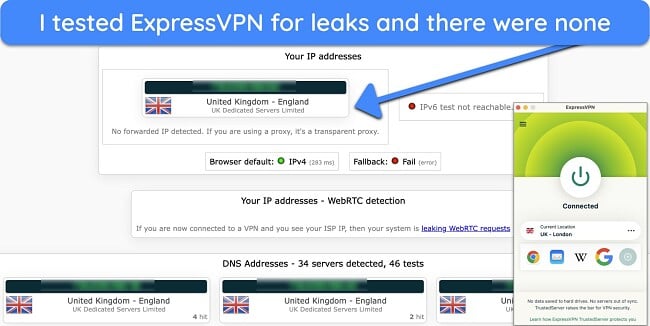
My location stayed hidden while using both ExpressVPN and IPVanish, and I ran multiple leak tests for both services to ensure that my data was secure at all times.
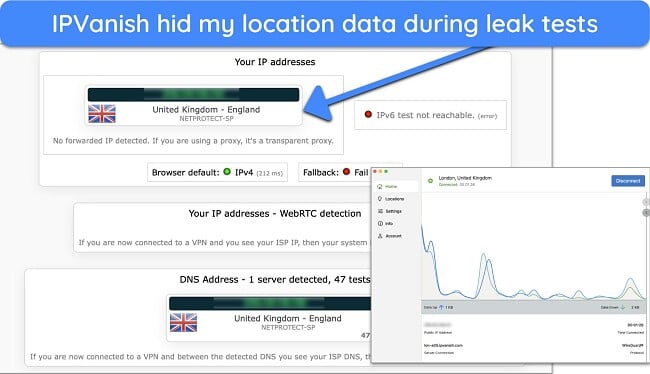
RAM-Only Servers
All of ExpressVPN’s servers are RAM-only, meaning they’re incapable of storing your data like browsing history long-term — everything is wiped with every reboot. This TrustedServer technology was audited by PWC, a trusted consulting firm, and they reported that ExpressVPN’s servers run just as advertised.
IPVanish’s network is not RAM-based, although it also claims it doesn’t log its customers’ information. Using hard drives to store data makes it more difficult to keep software consistently up-to-date and also needs manual resets to remove any compromising data.
Ad and Malware Blocker
ExpressVPN’s upgraded “Advanced Protection” lets you block unwanted elements while you’re browsing the web, but only when the VPN connection is active. Threat Manager blocks trackers and malicious sites, and you can also block ads and adult sites — useful if you share your device with your children.
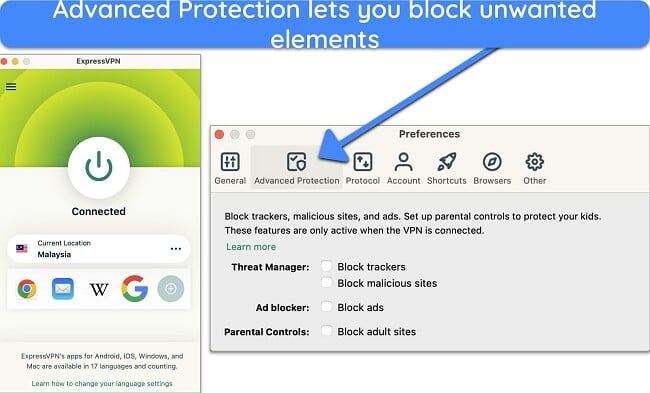
IPVanish on the other hand, doesn’t have a similar feature or capabilities in its apps.
Split Tunneling
Both VPNs have split tunneling. ExpressVPN has it on Windows, macOS, Android, and routers, while IPVanish offers it on Windows, Android, and Fire Stick. Split tunneling allows you to direct some of your device’s traffic through encryption while others bypass it. This speeds up your online activities since not all data has to be encrypted or sent through a VPN server.
The winner of the security category is ExpressVPN as it utilizes RAM-based servers to back its no-log policy. Plus, it has a few notable extras like ad and malware blocking, parental controls, and a kill switch available on more platforms.
Security Winner: ExpressVPN
6. Torrenting — Each VPN Has Its Own Advantage for Downloading P2P Files
Both ExpressVPN and IPVanish allow torrenting. IPVanish has SOCKS5 proxy servers, while ExpressVPN has a privacy-friendly jurisdiction.
Torrenting Safety
ExpressVPN’s security features and no-log policy make it a great choice for torrenting. More importantly, I like that ExpressVPN has how-to documentation about P2P on its website. It’s also headquartered in the British Virgin Islands, which isn’t subject to international data-sharing agreements or copyright enforcement.
IPVanish states in its Terms of Service that downloading any copyrighted materials can violate your contract. It’s also located in the US, a country known for strict copyright laws and internet data collection.
Just remember that sharing copyrighted material (even if you own a copy) is illegal, and I don’t condone breaking the law with or without a VPN.
Torrenting Speed
Most VPNs that support torrenting have P2P servers which provide faster speeds for a better download experience. ExpessVPN’s full server network is optimized for torrenting, which is great since you don’t have to find a specific server for downloading.
IPVanish also supports torrenting on its entire network. This means you’ll get the same speeds and security afforded to the whole server network, and you don’t have to pick a specialized server.
Additionally, IPVanish provides SOCKS5 proxy servers in 14 countries for torrenters. These transfer smaller data packets compared to other types of proxies to help speed up downloads. As proxy servers though, they’re incapable of encrypting your traffic so your connection is less secure. Still, it’s a nice option to have, and one that ExpressVPN doesn’t offer.
During tests, both ExpressVPN and IPVanish helped download a 3GB file in roughly the same time (4.5 minutes) when I used the local servers. Since SOCKS5 is a nice addition on IPVanish’s side and ExpressVPN’s location is ideal for torrenters, this category is a tie.
Torrenting Winner: Tie
7. China — ExpressVPN Is One of the Best VPNs for China
China employs the most rigorous firewalls to prevent people inside the country from accessing unapproved content. VPNs are always working to try and get around these firewalls, but very few are successful.
Unfortunately, I can’t recommend IPVanish for use in China. After extensive testing, our team found it’s not able to get around the tough firewalls the Chinese government uses. IPVanish also has support articles that say it’s unlikely to work.
While traveling to countries with strict government censorship, you need a VPN that is proven to work. ExpressVPN works diligently to maintain its ability to work in China, which is why it wins this category. Bear in mind that non-government-approved VPNs are illegal in China, but there’s been no record of tourists getting in trouble for using one.
China Winner: ExpressVPN
Editor’s Note: Transparency is one of our core values at WizCase, so you should know we are in the same ownership group as ExpressVPN. However, this does not affect our review process, as we adhere to a strict testing methodology.
8. Gaming — IPVanish Has Lower Ping While ExpressVPN Has Faster Speeds
A VPN can hide your IP address from DDoS attacks and give you a more direct connection to gaming servers for faster gameplay. Both VPNs were a joy to play with on local servers.
Gaming Speed
When you’re playing with others online, you need to have a fast connection. If you don’t, you’ll suffer from lag and likely be an easy target for opponents. A significant metric that impacts lag in gaming is ping, which measures latency or how long it takes for an action you take to manifest in the game. The lower the ping (latency), the better it is for gaming.
While gaming online with local VPN servers, I measured my speeds and ping. I consistently found that ExpressVPN had better speeds, while IPVanish had lower ping. IPVanish kept it below 30ms while ExpressVPN averaged above 40ms. In online gaming, these are both fantastic numbers to play fast-paced games like Call of Duty: Warzone without lags.
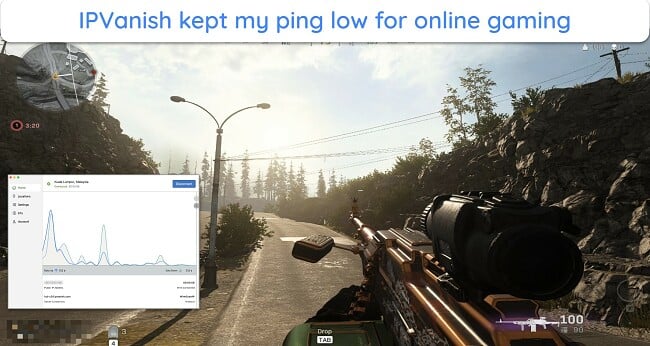
Gaming Security
DDoS attacks (Distributed Denial of Service Attacks) are becoming commonplace in the gaming world as people get more competitive. Hackers target your IP address and overload your connection, causing lag or even your server to crash.
The best way to protect yourself against DDoS attacks is to use a VPN that hides your real IP address. Luckily, both IPVanish and ExpressVPN hide your IP address to prevent DDoS attacks.
ExpressVPN and IPVanish both support routers, which can help protect your gaming consoles. By connecting your router to your ExpressVPN or IPVanish account, you can secure connections on your PlayStation, Xbox, and Nintendo Switch.
It’s a tie for gaming since both VPNs delivered great speeds and ping to play multiplayer games online without any lag.
Gaming Winner: Tie
9. Device Compatibility and App Differences — Both VPNs Have Advantages in This Category
ExpressVPN has native apps for a variety of devices, while IPVanish supports unlimited simultaneous connections.
Device Compatibility
Both VPNs offer native apps for Windows, macOS, Linux, Android, iOS, and more. Additionally, you can set up ExpressVPN and IPVanish on your router to secure your gaming consoles, like Nintendo Switch, PS4, Xbox One, and smart TVs. Connecting a VPN to your router also protects every device on your network.
One notable difference is that ExpressVPN has browser extensions for Chrome and Firefox, while IPVanish doesn’t offer browser extensions at all. Typically, a VPN browser extension is a proxy, which doesn’t provide the most secure connections. However, ExpressVPN’s browser extensions have the same security as its main VPN app to fully protect your device.
App Differences Between Operating Systems
I found ExpressVPN’s interface minimalistic and easy to learn, which makes it ideal for beginners. If you’re not sure which server to choose, ExpressVPN can do it for you with the Smart Location feature. The interface is similar across all the platforms, so you don’t have to learn how to use a new app each time you connect.
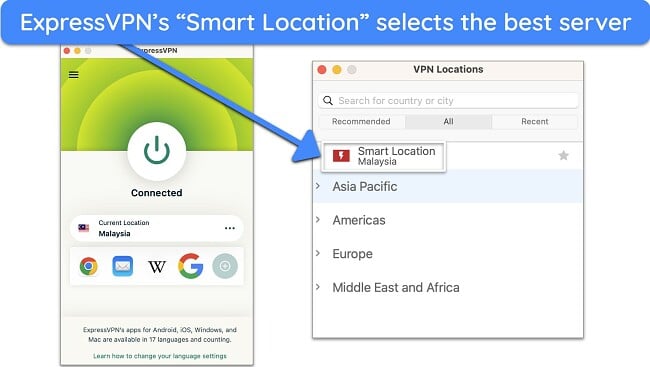
Some may find IPVanish’s interface a bit overwhelming, even though I feel it’s user-friendly. Its desktop client shows information that may not be relevant to every user (like time connected or data usage). It also has a map view to show server locations but thankfully, you can hide it if you find it tricky to navigate.
IPVanish also has a dark mode option that ExpressVPN doesn’t. If you don’t like bright screens, this might be useful to you. Like ExpressVPN, it also has an “Optimal location” button to connect you to the best server.
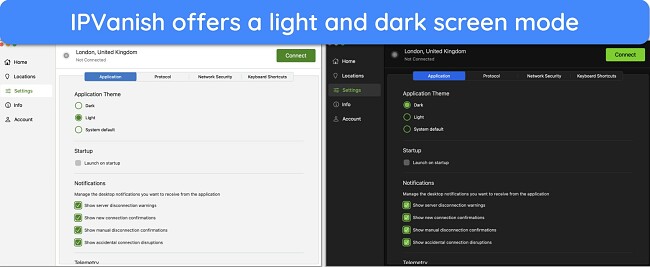
IPVanish’s Android and iOS apps are more streamlined, separating options and the server list on different pages. This layout is better than having everything on the main screen, which can be overwhelming. Both VPN’s mobile apps include an array of options in the settings menu like starting the VPN on device startup, a selection of protocols, and other options.
This category ends in a tie because each provider has its own advantages. ExpressVPN has more user-friendly apps in general, while IPVanish supports unlimited device connections (which is a huge benefit).
Device Compatibility and App Features Winner: Tie
10. Company Jurisdiction — ExpressVPN Can Keep Your Information Private
ExpressVPN wins this category as it’s based outside the 5/9/14 Eyes Alliance countries.
| ExpressVN | IPVanish | |
| Company Headquarters | The British Virgin Islands | US |
| Inside the 5/9/14 Eyes | No | Yes |
| Warrant Canary | ✘ | ✘ |
The 5, 9, and 14 Eyes alliances are groups of countries that share digital information. The United States is part of the 5 Eyes alliance, which makes it generally unpopular for VPNs. IPVanish is based in Los Angeles, California, which is a red flag. If the US government or local law enforcement puts pressure on IPVanish to share its information, it’s obligated to do so.
This is concerning, as IPVanish has a history of sharing user information with the government to aid criminal investigations. But truthfully, it’s not an option for any service provider to refuse government orders. All that matters is if a VPN collects data in the first place, which both VPNs don’t.
One thing I’m disappointed with is that neither VPN has a warrant canary available on their websites. Warrant canaries inform users whether a VPN has been served with a government subpoena despite being prohibited from revealing it. Still, no identifiable user data would be revealed even if a subpoena was issued, given their no-logs policies.
While I trust IPVanish due to its extensive security features, ExpressVPN has the edge because it falls outside the jurisdiction of the 5, 9, and 14 Eyes intelligence agreements.
Privacy and Anonymity Winner: ExpressVPN
Editor’s Note: Transparency is one of our core values at WizCase, so you should know we are in the same ownership group as ExpressVPN. However, this does not affect our review process, as we adhere to a strict testing methodology.
11. Privacy Policy — ExpressVPN Has Had Numerous Audits and Uses RAM-Based Servers
ExpressVPN has a solid no-logs policy that has been independently verified by multiple third-party audits since 2018. IPVanish’s no-log policy has been audited once under new ownership, but under old ownership it handed customer data over to government agencies.
Logging Policies
ExpressVPN and IPVanish both claim to have zero-log policies, meaning they don’t collect connection logs. However, in 2016 IPVanish shared customer information with the US government for a court case. IPVanish has since changed ownership and the new owners have stated that it’s now 100% log-free, with an independent audit to prove it.
ExpressVPN has participated in a PwC audit, which confirmed its no-log policy. In addition, when the Turkish authorities seized an ExpressVPN server, they found no customer data thanks to this logging policy and its RAM-only server infrastructure.
Privacy Policy Winner: ExpressVPN
12. Payment and Refunds — ExpressVPN Accepts More Payment Methods
ExpressVPN is the winner of this category with more payment methods and a better money-back guarantee. IPVanish only refunds long-term subscriptions and doesn’t allow cryptocurrency payments.
Payment Methods
| ExpressVPN | IPVanish | |
| Credit or Debit Cards | ✔ | ✔ |
| PayPal | ✔ | ✔ |
| Bitcoin | ✔ | ✘ |
| Mint | ✔ | ✘ |
| Other Payment Methods | Diners Club, JCB, Alipay, Union Pay, and many more | Diners Club, Union Pay, and Discover |
ExpressVPN and IPVanish both accept major credit cards, PayPal, and a few other popular payment methods. However, ExpressVPN accepts Bitcoin, which is an anonymous payment method that keeps your identity a secret from your VPN — especially if you use a throwaway email address.
Money-Back Guarantees
Both ExpressVPN and IPVanish have a 30*-day money-back guarantee, which lets you get a refund if you change your mind. With a fully automated method of requesting a refund, IPVanish makes getting your money back absolutely effortless. If you cancel your IPVanish account within the guarantee period, you’ll automatically get a refund for your subscription.
However, its refund policy is only valid with long-term plans — you can’t ask for a refund if you’re a monthly plan subscriber. The good thing is, I was refunded within 8 days of canceling my yearly plan.
To get a refund from ExpressVPN, you’ll have to contact customer support. With a no-questions-asked policy, getting your money back is really easy. I contacted an agent via 24/7 live chat and asked for my refund, and they processed my request right away. I got my money back in 5 days.
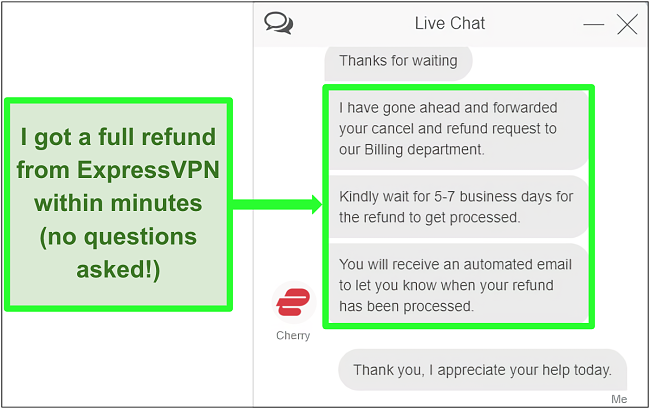
ExpressVPN wins this category because it offers refunds with its monthly plans and accepts Bitcoin.
Editor’s Note: Transparency is one of our core values at WizCase, so you should know we are in the same ownership group as ExpressVPN. However, this does not affect our review process, as we adhere to a strict testing methodology.
Payment and Refunds Winner: ExpressVPN
13. Customer Service — ExpressVPN Provides Quicker Response With More Helpful Support Agents
ExpressVPN’s live chat support agents are eager to help and respond quickly to customer service questions — without the interference of a bot. While IPVanish’s support bot is helpful, I had to provide a lot of details and wait a long time to get help from an agent.
Customer Service Speed
ExpressVPN’s customer support agents answered my emails in about an hour. IPVanish’s AI email response was fast at 10 minutes, but questions that required a human to answer took almost a whole day. However, IPVanish’s AI provided an adequate answer most of the time, which meant I didn’t have to talk to a person to get support.
The 2 VPNs are evenly matched when it comes to their live chat times. However, IPVanish relies on an AI, so it can take a few minutes to get in contact with an actual agent.
| ExpressVPN | IPVanish | |
| Live Chat | ✔ | ✔ |
| Average Wait Time for Live chat | 27 seconds with an agent | Immediately by AI, 2.5 minutes with an agent |
| Email Support | ✔ | ✔ |
| Average Wait Time for Email | 1 hour 45 minutes | 10 minutes by AI, 18 hours by an agent |
| Ticket Support | ✔ | ✔ |
| Phone Support | ✘ | ✔ |
| Online Knowledge Base | ✔ | ✔ |
| FAQ | ✔ | ✔ |
| Video guides | ✔ | ✔ |
Customer Service Knowledge
Generally, I found that both customer service teams were knowledgeable. However, when I contacted an IPVanish agent, I sometimes got a less helpful answer. The agent answered my question but didn’t send me any support articles to help me get things set up.
I found ExpressVPN offered a much more comprehensive service. The response times were faster and the emails had plenty of additional resources to help me resolve my questions.
| Questions | Initial Response Time By Email | Query Resolved | Number of Emails | |
| ExpressVPN | Does ExpressVPN have split tunneling on iOS? | 1 hour 48 minutes | ✔ | 1 |
| What is TrustedServer technology? | 1 hour 46 minutes | ✔ | 1 | |
| IPVanish | Can I use IPVanish to Unblock Netflix? | 19 hours 45 minutes | ✔ | 1 |
| How do I install IPVanish on my Samsung Smart TV? | 16 hours 57 minutes | ✔ | 1 |
While I appreciate using AI to get assistance faster, I found IPVanish’s agents less helpful. Both VPNs have an online knowledge base where you can search for setup guides and more, but ExpressVPN has a more extensive FAQ. Plus, its website is available in 16 languages. IPVanish offers support in English but the agents use a translation tool for other languages.
ExpressVPN’s customer support is quick, in-depth, and knowledgeable — that’s why it wins this round.
Customer Service Winner: ExpressVPN
Editor’s Note: Transparency is one of our core values at WizCase, so you should know we are in the same ownership group as ExpressVPN. However, this does not affect our review process, as we adhere to a strict testing methodology.
And the Winner Is…ExpressVPN
After putting ExpressVPN and IPVanish through a gauntlet of tests, ExpressVPN won in 9 categories. Here is the breakdown of the winning VPN for every category:
- Pricing: IPVanish
- Streaming: ExpressVPN
- Servers: ExpressVPN
- Speed: ExpressVPN
- Security: ExpressVPN
- Torrenting: Tie
- China: ExpressVPN
- Gaming: Tie
- Device Compatibility: Tie
- Company Jurisdiction: ExpressVPN
- Privacy Policy: ExpressVPN
- Payment and Refunds: ExpressVPN
- Customer Support: ExpressVPN
IPVanish is a great budget option and allows unlimited device connections under one login. It also provides surprisingly fast speeds, even on distant servers to support high-bandwidth activities. You can try IPVanish without risking your money using the 30-day money-back guarantee, but remember that this only applies to long-term plans.
ExpressVPN proved to be superior — in fact, it’s the best VPN on the market as of 2025. I was impressed by its faster speeds and advanced security features, all of which outperformed IPVanish. It works with every popular streaming service, as well as in restricted countries like China and Turkey, and has more useful features (like ad and malware blockers).
You can also try ExpressVPN risk-free as all its plans include a 30*-day money-back guarantee. If you’re not satisfied, you can easily get a refund over 24/7 live chat. When I tried this, I got my money back within 5 days.
Overall Winner: ExpressVPN
*Please note that ExpressVPN’s generous money-back guarantee applies to first-time customers only.
Other Top VPNs to Try in 2025
Editor's Note: We value our relationship with our readers, and we strive to earn your trust through transparency and integrity. We are in the same ownership group as some of the industry-leading products reviewed on this site: ExpressVPN, Cyberghost, Private Internet Access, and Intego. However, this does not affect our review process, as we adhere to a strict testing methodology.

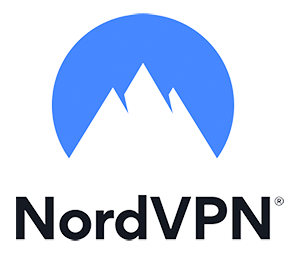




Leave a Comment
Cancel